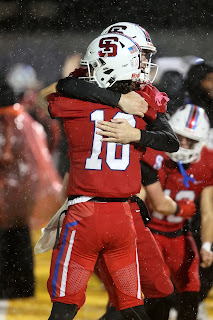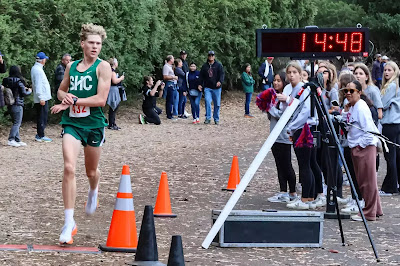One assignment in my Ethics class requires students to write a "Call to Action" letter to an organization or a particular politician. In addition to a grade, my students receive a envelope and a stamp. I don't know why it continues to surprise me, but for the past twenty years I have had to teach high school students how to format and address the letter. They cry, "No one writes letters anymore!" I pause. "That's interesting. I wrote Joe's college letter of recommendation two weeks ago." They respond "Those are different." "Are they? I ask. "Seems like there is a message that is delivered in the written form." While we may not use pen to paper, letters are not a thing of the past. We write cards and send text messages. We author thank you notes and pour out or hearts with love letters. And today, I read a new one: a love letter to a rival.
Letters in sports aren't uncommon. Upon his retirement Michael Jordan scripted a love letter to basketball; so did Kobe. When Barry Zito left the San Francisco Giants, he took out a full page in the San Francisco Chronicle that featured his letter of gratitude to the fans. I love when athletes think to do this. Earlier this year, I wrote about a letter from John Fisher, the owner of the Oakland A's. I read this "great work of fiction" to my class and much to my surprise, I got choked up. Letters are both personal and private, sometimes public, often revelatory.As written in The Athletic, "Roger Federer says Rafael Nadal made him “enjoy the game even more” as the Spaniard retires from tennis at the Davis Cup in Malaga, Spain this week.
Federer, who retired alongside Nadal at the 2022 Laver Cup, opened a letter in tribute to his great rival with the salient fact of their rivalry: “You beat me — a lot. More than I managed to beat you.” The letter, in its entirety is here:
Vamos, @RafaelNadal
As you get ready to graduate from tennis, I’ve got a few things to share before I maybe get emotional.
Let’s start with the obvious: you beat me—a lot. More than I managed to beat you. You challenged me in ways no one else could. On clay, it felt like I was stepping into your backyard, and you made me work harder than I ever thought I could just to hold my ground. You made me reimagine my game—even going so far as to change the size of my racquet head, hoping for any edge.
I’m not a very superstitious person, but you took it to the next level. Your whole process. All those rituals. Assembling your water bottles like toy soldiers in formation, fixing your hair, adjusting your underwear... All of it with the highest intensity. Secretly, I kind of loved the whole thing. Because it was so unique—it was so you. And you know what, Rafa, you made me enjoy the game even more.
OK, maybe not at first. After the 2004 Australian Open, I achieved the #1 ranking for the first time. I thought I was on top of the world. And I was—until two months later, when you walked on the court in Miami in your red sleeveless shirt, showing off those biceps, and you beat me convincingly. All that buzz I’d been hearing about you—about this amazing young player from Mallorca, a generational talent, probably going to win a major someday—it wasn’t just hype.
We were both at the start of our journey and it’s one we ended up taking together. Twenty years later, Rafa, I have to say: What an incredible run you’ve had. Including 14 French Opens—historic! You made Spain proud... you made the whole tennis world proud.
I keep thinking about the memories we’ve shared. Promoting the sport together. Playing that match on half-grass, half-clay. Breaking the all-time attendance record by playing in front of more than 50,000 fans in Cape Town, South Africa. Always cracking each other up. Wearing each other out on the court and then, sometimes, almost literally having to hold each other up during trophy ceremonies.
I’m still grateful you invited me to Mallorca to help launch the Rafa Nadal Academy in 2016. Actually, I kind of invited myself. I knew you were too polite to insist on me being there, but I didn’t want to miss it. You have always been a role model for kids around the world, and Mirka and I are so glad that our children have all trained at your academies. They had a blast and learned so much—like thousands of other young players. Although I always worried my kids would come home playing tennis as lefties.
And then there was London—the Laver Cup in 2022. My final match. It meant everything to me that you were there by my side—not as my rival but as my doubles partner. Sharing the court with you that night, and sharing those tears, will forever be one of the most special moments of my career.
Rafa, I know you’re focused on the last stretch of your epic career. We will talk when it’s done. For now, I just want to congratulate your family and team, who all played a massive role in your success. And I want you to know that your old friend is always cheering for you, and will be cheering just as loud for everything you do next.
Rafa that!
Best always, your fan,
Roger
 |
| Wimbledon 2008: largely considered to be one of the greatest matches every played. |
Ever gracious, it's not surprising that King Fed would recognize his chief rivals' success against him. However, what surprised me was his appreciation of Rafa's superstitions. Those ticks. The OCD? I found Nadal's rituals and his ways hard to watch on television. At times I would even look away from the camera until I knew the ball was in play. Rather than stand in judgment (I'm good at that) Fed said "I kind of loved the whole thing. Because it was so unique—it was so you." Tan bonito.
And still, Federer raises the bar by congratulating not just Rafa, but "your family and team, who all played a massive role in your success." Both men know tennis may be an individual sport but no one does it alone. The Nadal family name and even the people of Mallorca have a right to share in the celebration of this legend.
I am grateful that one of tennis' greats took the time to share his sentiments and honor his greatest rival in the form of missive. He models for us an important and timeless action. In order to write a letter, one must reflect upon another person and consider why you care about them and what they mean to you. With a public or open letter, we the fans received a small window into something we saw develop often twenty years time. And as Proverbs 27 proclaims, As iron sharpens iron, so one person sharpens another. Sports fans around the world were witnesses to one man becoming better both on and off the court because of a shared love, a shared game: tennis. Rivals? Yes. Friends? Amen.























